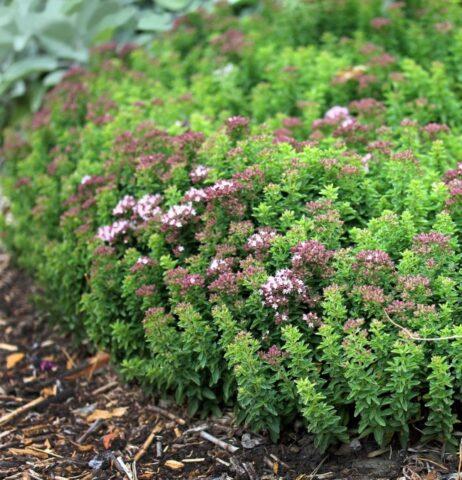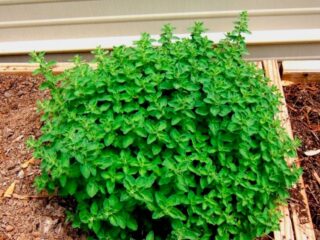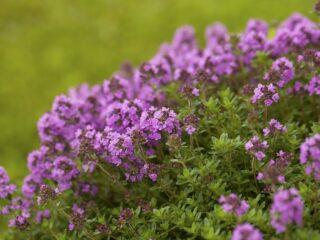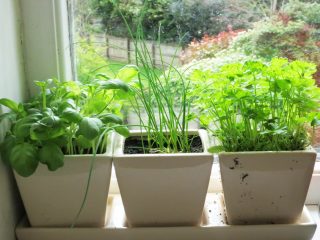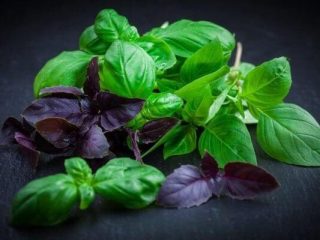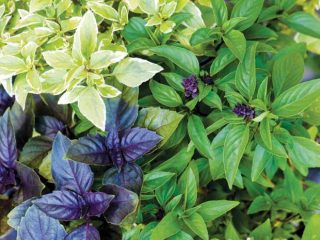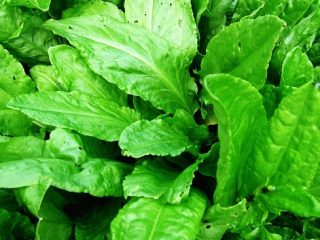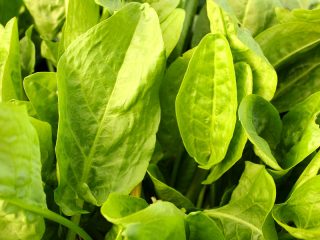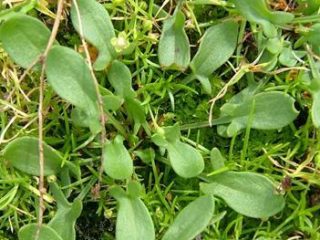Content
The quality of the harvested raw materials depends on the ability to collect oregano and dry it correctly. The most healthy and tasty drink from it is obtained by gardeners who adhere to a certain number of rules.
Oregano varieties for preparing tea for the winter
In addition to specific varieties, gardeners also distinguish types of oregano. This is due to the fact that the plant is widespread, but has acquired individual regional characteristics:
- Dwarf oregano looks similar to marjoram and acquires a bright taste and smell only if it is planted in a sunny place. Often grows as a ground cover crop. It is easy to care for, has a pleasant aroma, and has pink buds.
The dwarf variety contains relatively few essential oils
- Italian oregano is a hybrid characterized by good winter hardiness and a spicy-sweet aroma.
The Latin name for Italian oregano is Origanum x majoricum.
- Mexican oregano has a long flowering period.
The buds of the Mexican species are tubular and reddish-pink in color.
Most often, gardeners buy oregano. It grows well in Russia.It is a perennial, reaching a height of 90 cm. Its inflorescences are purple, pinkish, and less often white.
The stems are straight, with four edges, pubescent, branched on top. The leaves are ovate-shaped, with a pointed end.
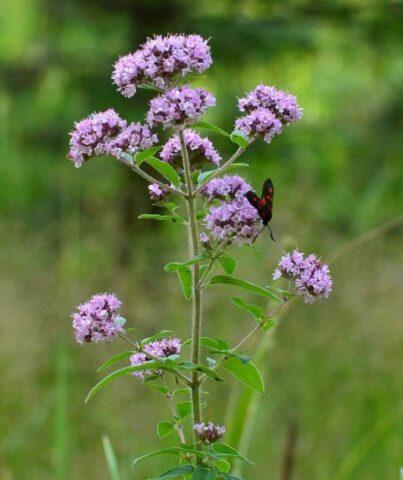
Oregano buds are small, collected in scutes that look like a panicle
There are varieties whose purpose is to decorate the garden. Species such as Northern Lights and Dushka are popular as spices. For tea, it is recommended to purchase the following varieties:
- Honey aroma;
- Swan;
- Fragrant bunch;
- Fairy.
When choosing a variety, you need to take into account the duration of flowering, features of care and planting.
When and where to collect oregano
If there is no bed with a plant in the garden, then it can be collected from the wild. The timing depends on the region where the crop grows. The best time to collect oregano in the south is in July. The further north the region, the later flowering begins, so in some areas the plant can be harvested until September.
To properly harvest oregano, it is important to adhere to the following principles:
- the meadow with oregano should be well lit by the sun;
- It is forbidden to pull out the crop along with its roots, otherwise the risk of plant degeneration in its natural habitat increases:
- You should not cut flowers along roads, near buildings, factories;
- the bush should be clean, free of dirt and cobwebs.
The quality of raw materials depends on the competence of the procedure. Intact, healthy stems with open buds are to be collected. You need to cut branches at a height of 25-50 cm from the ground. You should not cut off the stems, as there is a high risk of damage to the rhizome. The best option would be to use pruners or scissors.
If a flowering shrub is covered in dirt, it should be washed and left in the sun until completely dry. You should not collect wet branches, as mold may appear on them in the future.

During collection, you need to carefully inspect the plant: it is impossible for insects or debris to remain in it.
Preparing oregano for drying
To obtain high-quality raw materials, not only the plant collection stage is important, but also its further processing.
It is customary to dry the entire branches. If oregano is crushed, it will partially lose its beneficial substances. It is allowed to wipe the leaves and buds with a damp cloth to remove dust. It is recommended to remove the affected parts of the crop.
Preparation consists of collecting stems into bunches of 7-15 branches. The resulting bouquet needs to be tied with thread. It is recommended to separate the leaves from the flowers if the gardener plans to add the crop not only to tea, but also to dishes as a spice.
How to dry oregano
The choice of method is at the discretion of the gardener. To obtain high-quality raw materials, it is necessary to adhere to the work algorithm.
On open air
The maximum shelf life of oregano that has been processed correctly. The most common drying method is open air. This method allows you to preserve the beneficial substances of the plant and its aroma. The duration of the procedure is 3-6 days.
There are several ways to dry oregano in the open air after collection:
- Cover the horizontal surface with paper. To do this, it is best to use a sieve, wire rack or baking sheets, cutting boards, or boxes. After collecting, spread the grass in layers, no more than 6-8 cm thick. The oregano should be stirred twice a day to ensure even drying.
- Vertical drying on bars or ropes.After collection, the bunches of oregano should be hung upside down. Periodically, raw materials should be inspected and replaced.
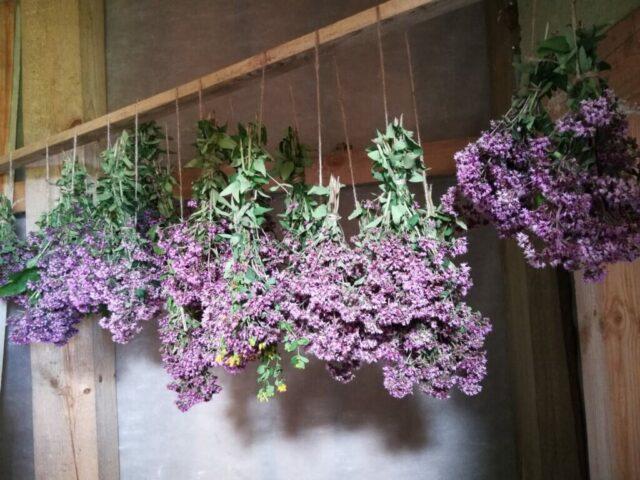
When drying vertically, the grass should be provided with air access, so there should be a small distance between the bunches
Open air does not mean direct sunlight. The room should be clean, well ventilated, with a humidity of no more than 50-60%. Most often, gardeners prefer balconies, attics or sheds.
In the oven
This method of harvesting oregano is not the best option. If the temperature regime is violated, there is a high risk of damage to raw materials. Drying herbs in the oven is popular among gardeners who want to reduce the time of the procedure. Most often, all manipulations take from one to three hours.
Algorithm of actions:
- Line a baking sheet or wire rack with baking parchment.
- After collecting, spread the oregano evenly over the surface.
- Set the temperature on the timer to no higher than 40 °C.
- Dry the oregano after harvesting for 20 minutes, without closing the door completely. If the stove is gas, then the gap should be at least 14-20 cm. When using an electric oven, the distance can be reduced to 4-5 cm.
- Turn off the oven and allow the herb time to cool completely. To do this, periodically turn the shoots over.

Even when setting a low temperature in the oven, there is a risk that the herb will partially lose its properties and aroma
In an electric dryer or dehydrator
This method is optimal for processing grass after collection. The duration of the procedure is 2-4 hours.But before starting work, you should make sure that the device has a “grass” mode, or there is the possibility of manual temperature control.
Algorithm of actions:
- Place stems or small branches in one layer on the device’s grilles.
- Set the temperature to no more than 35-40 °C.
- Change the location of the grates every 30 minutes to ensure the raw materials dry evenly after collection.
- When finished, leave the grass until it cools down.
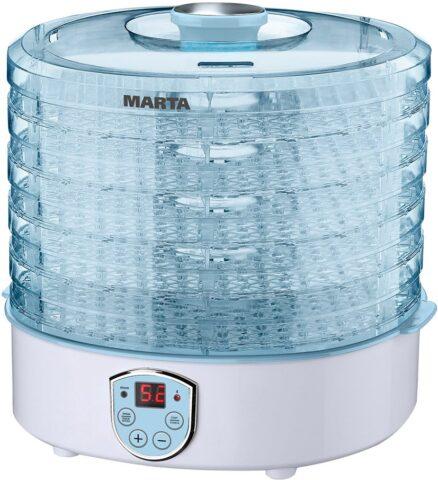
Do not fill the device grids tightly, as this will slow down the air circulation between the layers and lead to disruption of the process
How to store dried oregano
Most often, after harvesting, gardeners dry the grass and leave it in its original form indoors. To do this, just cover it with insect repellent gauze. But this method is irrational: if moisture gets in, the grass will deteriorate.
It is recommended to process the raw materials after collecting and drying: crush the oregano with your fingers, discarding the thick stems. You can separate the flowers from the leaves to add the plant not only to tea, but also as a spice in dishes.
The optimal containers for storage are fabric bags, cardboard or wooden boxes, and ceramic containers.

It is not recommended to store oregano together with herbs unless you are sure that they can be combined with each other.
Please note that the maximum shelf life does not exceed 1.5 years. If rot, unpleasant odor or insects appear, further use of the dried plant is impossible.
Conclusion
If you collect oregano correctly and store it, you can enjoy aromatic tea and delicious dishes all winter. The crop grows safely both in the wild and on the site, so collecting and preparing raw materials does not cause difficulties. The quality of the resulting product depends on the competence of the work performed.
